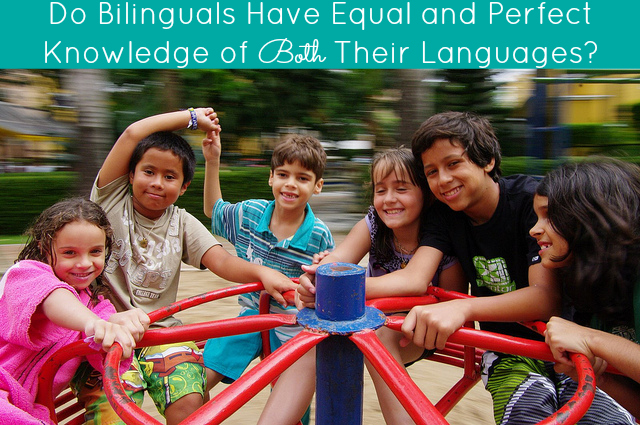A couple of days ago, I overheard my daughter speaking in English while she was playing by herself with her My Little Pony collection. I made it a point to observe her a bit more intently – without her knowledge, of course – just to make sure she wasn’t just saying a few words in English, as she’s done in the past. I don’t know why it surprised me, but the whole time the ponies were speaking English to eachRead More ...
Do Bilinguals Have Equal and Perfect Knowledge of Both Their Languages?
To Correct My Child’s Mistakes in Spanish or Not…
“Estoy terminado,” is what my son says every time he’s done eating. Not, “he terminado,” or “ya terminé.” When he wants to know what something’s for, the question is, “¿Qué es eso para?” And it drives me absolutely crazy. Because both examples are such direct translations from English. I am finished. Estoy terminado. What’s that for? ¿Qué es eso para? As I do whenever my boys say something that’s not quite right, I correct them gently without quite correcting themRead More ...
How Can it be Illegal to Teach Our Children Latino History?
On Monday, I sat down with my 2 boys and read them a copy of “Free at Last! The Story of Martin Luther King, Jr.” I read to them about the bus boycotts and the March on Washington. I tried to explain to my 5-and almost 7-year-old boys that sometimes people are so uncomfortable with a group of people that they will do anything they can to keep them down. My 7-year-old said that Martin Luther King, Jr. lived aRead More ...
The Seal of Biliteracy: Recognizing Bilingual Students
Back in 1997 I was a graduate student in Philadelphia finishing a degree for Teaching English as a Second Language (TESOL). The study of language acquisition was an important part of the program. My classmates and professors all valued the ability to speak other languages, and therefore, we were shocked and confused when we learned of a proposition on the ballot in California which would institute an English only language policy throughout public schools in the state. I had spentRead More ...
Why Does Spanglish Get Such a Bad Rap?
Last week I was pretty taken aback when I heard someone say that “el Spanglish es una aberración” (literally an aberration, an outrage). The craziest thing is that this person — an old colleague and friend of my husband’s who is Argentinian, but has lived in Miami for a long time — said this as he admitted to using it himself! Then I realized I got exactly what he meant because I used to be one of them: the anti-Spanglish,Read More ...
Spanish is a Muscle
As a devout gym rat, I am closely acquainted with the process of building and losing muscles, tweaking strength, hitting plateaus. For me, Spanish is like a muscle. If I use it at a time of day when I’m energized and have adequate fuel, or when I have the motivation of fellow exercisers, I can speak at a good pace and never get tired or tripped up. If I am forced to use that muscle unexpectedly, though, or am simplyRead More ...
My Bilingual Daughter
httpv://www.youtube.com/watch?v=NFV_c5MZ23Y One of the biggest fears for those of us raising our bilingual children using the mL@H (minority language at home) method is that they won’t get enough exposure to the majority language, in this case English, and will be behind once they enter preschool or Kindergarten. It certainly was one of my very real worries and, from the Ask an Expert questions, comments, and emails we’ve gotten from you, it seems like it’s something that’s been on your mindRead More ...
Living a trilingual life: It’s not all black and white
As I typed out the title of this posting I could not help but form a smirk on my face. Here’s the deal. The further I delve into the work of identity construction in my doctoral program, the more I realize that individuals take on multiple identities depending on the context they are in, including several other elements that come into play. Even in the previous sentence I wrote there are several words I would have to define to explainRead More ...










